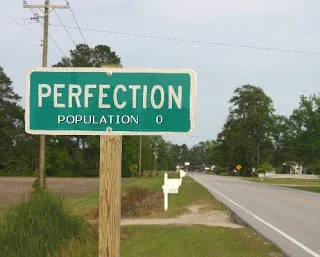Throughout my time in session, I notice a common theme that comes to the forefront of many of the conversations I have with people. It often enters our talks through statements like “I don’t feel like I measure up”, and “It feels like nothing I do is ever good enough.” All of these statements lean toward a sense of impossible standards and self-expectations, which people understandably respond to with feelings of discomfort and distress. Through exploration in session, these conversations often lead to the naming of a particularly troublesome stance to view oneself and the world: Perfectionism.
What is Perfectionism?
Perfectionism seems to be a common thread in the Western World. Perfectionism requires people to strive toward impossible ends, only to be met with discouragement and dissatisfaction. It is chasing a mythical set of ideals. If you were to fully commit yourself to living totally in line with perfectionism, what do you suppose that might be like? Since I hear about the experience often, I would expect that you would similarly receive limited joy from your efforts, and be satisfied with nothing you do. When we are held to perfectionistic standards, our efforts simply cannot be good enough, because the marker we’re striving to meet is beyond the bounds of possible.
The Roots of Perfectionism.
Since it is so much a part of our culture, it is a learned orientation to life. I often hear people say that perfectionism is something they were born with, but I encourage people to remember that it’s an ideal we’re taught early in life, and that some of us have had very forceful teachers. People I meet who find perfectionism to be particularly problematic have often been on the receiving end of harsh and persistent criticism at some time in their lives. That kind of verbal or emotional abuse can be like perfectionism in its most destructive form: negating people’s strengths and pushing a belief that they are inherently deficient. Unfortunately, there is no subtraction function on experiences and memories and those words cannot be unheard, so people with those experiences must learn to navigate perfectionism even after the abuse stops. Afterall, we learn to talk to ourselves through the way we were talked to in early life.
“Perfectionism is a self destructive and addictive belief system that fuels this primary thought: If I look perfect, and do everything perfectly, I can avoid or minimize the painful feelings of shame, judgment, and blame.” ― Brené Brown, The Gifts of Imperfection: Let Go of Who You Think You're Supposed to Be and Embrace Who You Are
Problems With Perfectionism.
Perfectionism prescribes a view of the world that is tremendously limiting, requiring us to look at things as “right” and “wrong”, “pass” or “fail”, “perfect” or “imperfect”. This black-and-white perspective implies that there is no room for the nuances, or “grey,” in between.
One downside to this perspective is that it doesn’t leave room for people to celebrate their efforts and experiences if they aren’t carried out “perfectly”. It focuses very much on the ends rather than the means, which ultimately are more meaningful. For example, a lot of people have told me about small victories and achievements they’ve accomplished, only to qualify them with a negative and critical, “Yeah, but…” In this way, impossible standards cast a shadow on anything we might otherwise be proud of. It’s as if our competence is constantly on trial and every move we make is being used as evidence against us. By ourselves!!
How Do We Resist the Pull Toward Perfectionism?
We inherently resist what feels like oppression, and perfectionism is oppression from within that we learned from the world around us. Some people might remind themselves persistently that they can only do their best and nothing more. The repetitive nature of this correction to ourselves can be learned and ‘absorbed’ into our daily functioning. Others might take up interests or hobbies that go against the grain of perfectionist standards and expectations (painting, gardening, etc…). Anything that can focus attention on the means vs the ends and allow for appreciation of subtle imperfections as meaningful.
Some people’s emotional responses to perfectionism, like worry or sadness, might be looked at through a lens of resistance as a refusal to do certain things or go to some places where they’re likely to be evaluated by perfectionistic standards – such as a workplace, school, or spending time with others who might demand perfection from them. These emotions are natural in response to the oppression of perfection, yet, they then lead to a natural “experiential narrowing” in which we only do those things in life that are comfortable to us
Here are some questions that you might find helpful in regard to perfectionistic expectations:
--In what ways have you been encouraged to take up your perfectionistic way of living? Who were the main teachers of it in your life?
--If you were to devote your time to living up to perfectionistic standards, what aspects of your life might you miss out on?
--Which of your skills, knowledge, or abilities would most likely go unrecognized by a perfectionistic perspective?
--What are some ways that you’ve resisted being evaluated according to perfectionism, if even privately?
--What efforts and achievements would you be able to celebrate if you were to reject perfectionism altogether?
If you, or someone you know, is struggling with the emotional aftermath of perfectionist thinking and want help in working through the process described above, consider contacting me at (717) 288-5064 / gregghammond@restoringbalancelancaster.com and schedule an appointment today.


